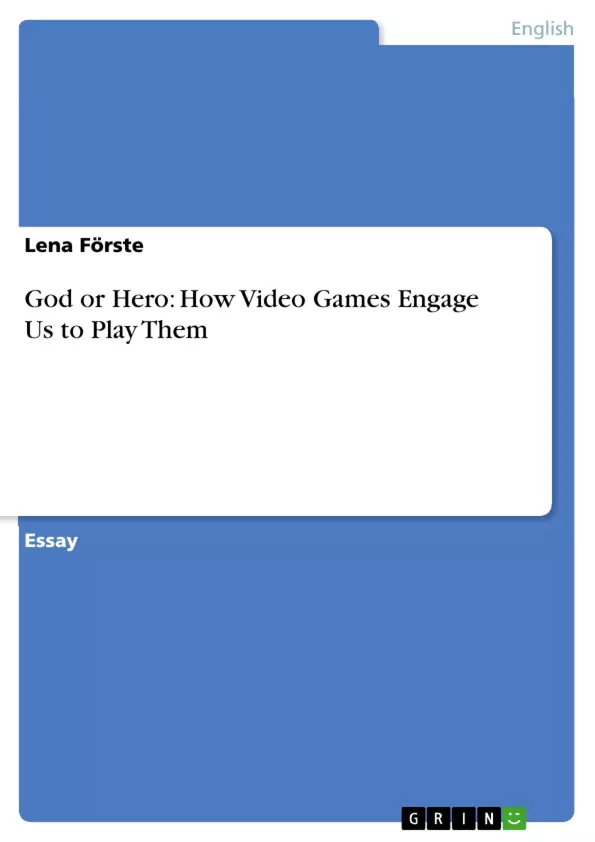The action adventure game "The Legend of Zelda: Ocarina of Time" and the life simulation game "The Sims 3" are two of the best-selling video games ever produced. Although both are very popular, they differ strongly from each other, not only concerning their structure but also in the game experience they offer their players. Video games are primarily developed and produced to entertain people and to make them enjoy their leisure time (Dickey), however, people have different desires and views of fun, and as a consequence their requirements on video games differ as well. To meet these requirements, game designers developed various genres which use different methods to engage the player to play and especially to keep playing. In this essay I will compare some of the game play strategies used in "The Sims 3" and in "The Legend of Zelda: Ocarina of Time" by investigating how they engage the player to keep on playing.
Inhaltsverzeichnis (Table of Contents)
- God or Hero: How Video Games Engage Us to Play Them
- The Legend of Zelda: Ocarina of Time
- Saving the World and Protecting the Weak
- The Illusion of Being a Hero
- Immersion and Control
- Rewards and Motivation
- The Sims 3
- The Power of Creation
- The God Complex
- Point of View and Control
Zielsetzung und Themenschwerpunkte (Objectives and Key Themes)
This essay explores the engaging aspects of video games, specifically comparing the strategies used in The Legend of Zelda: Ocarina of Time and The Sims 3. The author aims to understand how these games keep players engaged through different gameplay mechanics and storytelling approaches.
- The Role of Narrative and Storytelling in Video Games
- The Importance of Player Immersion and Control
- The Use of Rewards and Motivation in Gameplay
- The Concept of Player Agency and the Creation of Meaningful Experiences
- The Power of Fantasy and Escapism in Video Game Design
Zusammenfassung der Kapitel (Chapter Summaries)
The first section explores the engaging strategies of The Legend of Zelda: Ocarina of Time, a classic action-adventure game. The author highlights the game's captivating story of saving the world from evil, which is further enhanced by the player's identification with the protagonist, Link. The essay analyzes how the game's control mechanics contribute to player immersion, and how the use of rewards encourages specific gameplay behaviors. The following section focuses on The Sims 3, a life simulation game. The author emphasizes the unique power of the player to create their own characters and storylines, offering a sense of godlike control over the Sims' lives. The game's perspective and control mechanisms, which allow the player to observe and intervene in the simulation, further contribute to this feeling of agency and power.
Schlüsselwörter (Keywords)
This preview focuses on the concepts of player engagement, gameplay strategies, video game genres, narrative design, immersion, player agency, and the role of rewards and motivation in video game design. The analysis highlights the differences between action-adventure and life simulation games, showcasing how each genre engages players in unique ways.
Frequently Asked Questions
How does "The Legend of Zelda: Ocarina of Time" engage players?
It uses narrative immersion, allowing the player to identify as a hero saving the world, combined with reward systems and tight control mechanics.
What is the "God Complex" in "The Sims 3"?
The game offers a sense of godlike control, where engagement comes from the power to create life, manipulate environments, and oversee a simulated world.
What are the main differences between these two game genres?
Action-adventure games like Zelda focus on a fixed heroic narrative, while life simulations like The Sims focus on player agency, creativity, and open-ended gameplay.
Why do people have different views of "fun" in video games?
Engagement depends on individual desires; some seek escapism through heroic fantasy, while others enjoy the strategic management of simulated reality.
How does player control affect immersion?
Effective control mechanics bridge the gap between the player and the game world, making the experience more convincing and motivating the player to keep playing.
- Quote paper
- Master of Education Lena Förste (Author), 2012, God or Hero: How Video Games Engage Us to Play Them, Munich, GRIN Verlag, https://www.grin.com/document/1247557



